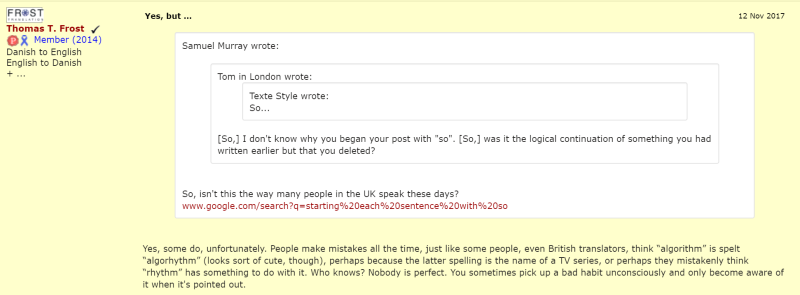Such as, but not limited to Google Translate Thread poster: Emily Scott
|
|---|
Emily Scott 
United Kingdom
Local time: 00:10
Member (2018)
French to English
+ ...
I always wonder when I read in NDAs something along the lines of "you agree not to upload, transmit or send in hardcopy or electronic form, any such source materials or files to any external or web-based software, tools, repositories or Services (such as, but not limited to "Google Translate")" what this actually means. I find sites like Reverso Context quite useful for looking up the odd word or phrase and to me, this doesn't really feel like a breach of confidentially if all I am looking up ar... See more I always wonder when I read in NDAs something along the lines of "you agree not to upload, transmit or send in hardcopy or electronic form, any such source materials or files to any external or web-based software, tools, repositories or Services (such as, but not limited to "Google Translate")" what this actually means. I find sites like Reverso Context quite useful for looking up the odd word or phrase and to me, this doesn't really feel like a breach of confidentially if all I am looking up are a few words that contain no confidential information. If you were putting the whole text into Google Translate then that would be a different story but I really can't see any harm in using these sites just to look up a word or a short phrase here and there. Is there a general consensus on this? What are we allowed/not allowed to do regarding these sites and the NDAs we sign? Would really love to hear everyone else's take on this! ▲ Collapse
| | | | | Seems a reasonable approach | Mar 30, 2020 |
If we applied such NDAs literally and rigorously, we wouldn't even be allowed to look up the word 'and' in an online dictionary. That would not seem a reasonable interpretation, so we need to use common sense.
| | | | Tom in London
United Kingdom
Local time: 00:10
Member (2008)
Italian to English
| Who's to know? | Mar 30, 2020 |
Emily Scott wrote:
I always wonder when I read in NDAs something along the lines of "you agree not to upload, transmit or send in hardcopy or electronic form, any such source materials or files to any external or web-based software, tools, repositories or Services (such as, but not limited to "Google Translate")" what this actually means. I find sites like Reverso Context quite useful for looking up the odd word or phrase and to me, this doesn't really feel like a breach of confidentially if all I am looking up are a few words that contain no confidential information. If you were putting the whole text into Google Translate then that would be a different story but I really can't see any harm in using these sites just to look up a word or a short phrase here and there. Is there a general consensus on this? What are we allowed/not allowed to do regarding these sites and the NDAs we sign? Would really love to hear everyone else's take on this!
How are they ever going to know? You might have consulted GT but then done your own translation. So even if they have your IP address and have memorised what you were doing, who's to say you weren't just cross-checking against your own translation? Besides, my understanding is that if you "correct" any of the suggestions made by GT, Google steals them and adds them to its own algorhythm. So- what's sauce for the goose is sauce for the gander.
| | | | Tony M
France
Local time: 01:10
Member
French to English
+ ...
SITE LOCALIZER | The trouble is... | Mar 30, 2020 |
Looking up a single word out of context (unless that word is a company-specific neologism) obviously cannot be reproached, as Thomas Frost points out.
HOWEVER, if you search for an expression of several words (even two), as we so often find on KudoZ, this is often enough to identify the source document, or one from the same company; this then becomes a different problem, since while the terms in themselves may not be confidential (although some concepts might be), the fact of identifying t... See more Looking up a single word out of context (unless that word is a company-specific neologism) obviously cannot be reproached, as Thomas Frost points out.
HOWEVER, if you search for an expression of several words (even two), as we so often find on KudoZ, this is often enough to identify the source document, or one from the same company; this then becomes a different problem, since while the terms in themselves may not be confidential (although some concepts might be), the fact of identifying the company, even indirectly, can often be a breach of another common NDA requirement: that of not revealing for whom you may be working. ▲ Collapse
| | |
|
|
|
Thomas T. Frost wrote:
If we applied such NDAs literally and rigorously, we wouldn't even be allowed to look up the word 'and' in an online dictionary. That would not seem a reasonable interpretation, so we need to use common sense.
The purpose of such clauses is to prevent confidential information from being passed on to third parties. If the translator takes proper steps to anonymize said information and is merely checking for nice and well-suited translations of "BigCompany shall purchase 999 shares of LittleCompany for the purchase price of USD 99,999,999" then the other party would be hard-pressed to show that this generic sentence even comes from their assignment.
| | | | | You say tomato and I say algorithm | Mar 30, 2020 |
Tom in London wrote:
Besides, my understanding is that if you "correct" any of the suggestions made by GT, Google steals them and adds them to its own algorhythm. So- what's sauce for the goose is sauce for the gander.
Far be it from me to correct an esteemed colleague, but in this case I'll make an exception, as said colleague's standards of literacy are impeccably high, and an example to us all...
I'm pretty sure algorithms are more common than algorhythms, unless you're on a Spanish dance floor?
| | | | | Old Tominlondonism | Mar 30, 2020 |
Andrew Morris wrote:
Tom in London wrote:
Besides, my understanding is that if you "correct" any of the suggestions made by GT, Google steals them and adds them to its own algorhythm. So- what's sauce for the goose is sauce for the gander.
Far be it from me to correct an esteemed colleague, but in this case I'll make an exception, as said colleague's standards of literacy are impeccably high, and an example to us all...
I'm pretty sure algorithms are more common than algorhythms, unless you're on a Spanish dance floor?
It's an old Tominlondonism. I discreetly pointed it out over two years ago over here:
https://www.proz.com/forum/business_issues/320390-how_do_i_explain_how_i_feel_to_my_client-page2.html

I'm sure Tom is now busy trawling through everything you've ever written, Andrew, to come up with a comprehensive digest of all your mistakes (and I'm probably next in line for being torn to digital shreds). 😁
| | | | | May the games begin!! | Mar 30, 2020 |
Thomas T. Frost wrote:
I'm sure Tom is now busy trawling through everything you've ever written, Andrew, to come up with a comprehensive digest of all your mistakes (and I'm probably next in line for being torn to digital shreds). 😁
Mistakes???? 
Bring it on. I may well have the odd typo, but spelling mistakes have never really been my thing...
But in the spirit of a bit of good old joshing, I'm up for any correction, any time... It wouldn't really be a problem as I'm not setting myself up as arbiter-in-chief. So I'd just say "Damn, you're right!" or "Touché". No big deal...
| | |
|
|
|
How many people can afford to use offline translation tools, i.e. paper dictionaries and the like, it would take too long. Especially when you understand the meaning but are looking for alternative suggestions. The important thing is to avoid specifics if you use Google, DeepL, Reverso, the translate function within Word etc.
If you have an API key for the MT resource within your CAT I guess this ensures confidentiality, although free MateCAT claims to ensure confidentiality if you ... See more How many people can afford to use offline translation tools, i.e. paper dictionaries and the like, it would take too long. Especially when you understand the meaning but are looking for alternative suggestions. The important thing is to avoid specifics if you use Google, DeepL, Reverso, the translate function within Word etc.
If you have an API key for the MT resource within your CAT I guess this ensures confidentiality, although free MateCAT claims to ensure confidentiality if you select the right option. See this example of a condition:
"Google Translate and other free online translation/CAT/machine translation tools or pages ARE NOT allowed since they DO NOT guarantee data confidentiality; While paid CAT tools, such as Trados or MemoQ are allowed, human-made translation is required." ▲ Collapse
| | | | Samuel Murray 
Netherlands
Local time: 01:10
Member (2006)
English to Afrikaans
+ ...
Emily Scott wrote:
I always wonder when I read in NDAs something along the lines of "you agree not to upload, transmit or send in hardcopy or electronic form, any such source materials or files to any external or web-based software, tools, repositories or Services (such as, but not limited to "Google Translate")" what this actually means.
The agency wants you to agree to something that is far more restrictive than necessary, knowing that you are going to break this agreement, but without having the intention of enforcing it unless becomes truly, truly necessary. It makes it easy for the client to consider you the guilty party when anything goes wrong or not according to their liking. I'm sure if you ask the PM things like "oh, so I can't send the files by e-mail" that they will tell you that it doesn't mean that... even though it does.
| | | | esperantisto 
Local time: 03:10
Member (2006)
English to Russian
+ ...
SITE LOCALIZER
Tom in London wrote:
…Google steals them and adds them to its own algorhythm.
Not sure about its own algorhythm, whatever it is, but a couple of years I made a simple experiment as follows: several times edited a phrase translated by Google Translate and submitted by pressing Improve translation. After a couple of weeks, Google Translate would still suggest its translation, not mine.
| | | | | Does Google Translate or similar have any rights to their translation if we use it? | Jul 13, 2021 |
I'm only an occasional translator and recently I was told that DeepL which I had not heard of before was good for terminology . So I tried it out the free version for a tricky bit of legalese in a Terms and Conditions from German and it came out with a text that I decided did not need much tweaking. But now I'm worried that DeepL might discover "their" translation on the TC once they are published online by the company and somehow trace it back to me and say they have the rights to it? For the ... See more I'm only an occasional translator and recently I was told that DeepL which I had not heard of before was good for terminology . So I tried it out the free version for a tricky bit of legalese in a Terms and Conditions from German and it came out with a text that I decided did not need much tweaking. But now I'm worried that DeepL might discover "their" translation on the TC once they are published online by the company and somehow trace it back to me and say they have the rights to it? For the free version you don't need to sign up at all so I am not aware of agreeing to anything...
I ▲ Collapse
| | |
|
|
|
Tom in London
United Kingdom
Local time: 00:10
Member (2008)
Italian to English
| Thanks Andrew | Jul 13, 2021 |
Andrew Morris wrote:
Tom in London wrote:
Besides, my understanding is that if you "correct" any of the suggestions made by GT, Google steals them and adds them to its own algorhythm. So- what's sauce for the goose is sauce for the gander.
Far be it from me to correct an esteemed colleague, but in this case I'll make an exception, as said colleague's standards of literacy are impeccably high, and an example to us all...
I'm pretty sure algorithms are more common than algorhythms, unless you're on a Spanish dance floor?
Thanks Andrew- you're correct. I could try to pretend I was referring to Al Gore and his dancing, but that would be a bit far-fetched. In mitigation, and quoting Oscar Wilde, "algorithm" is "not a word of mine". That's why I got it wrong.
[Edited at 2021-07-13 09:36 GMT]
| | | | Adieu 
Ukrainian to English
+ ...
| NDAs are written opportunistically | Jul 13, 2021 |
The idea is to write as much probably-won't-fly-in-court BS as possible, since the aim is NOT actually to sue everyone, but simply retain the option to throw the book at selected singular "anyones".
And even then, the main mechanism of NDAs is to threaten those selected individuals with legal consequences, rather than to actually pursue litigation on a grand scale.
[Edited at 2021-07-13 14:14 GMT]
| | | | To report site rules violations or get help, contact a site moderator: You can also contact site staff by submitting a support request » Such as, but not limited to Google Translate | Trados Studio 2022 Freelance | The leading translation software used by over 270,000 translators.
Designed with your feedback in mind, Trados Studio 2022 delivers an unrivalled, powerful desktop
and cloud solution, empowering you to work in the most efficient and cost-effective way.
More info » |
| | CafeTran Espresso | You've never met a CAT tool this clever!
Translate faster & easier, using a sophisticated CAT tool built by a translator / developer.
Accept jobs from clients who use Trados, MemoQ, Wordfast & major CAT tools.
Download and start using CafeTran Espresso -- for free
Buy now! » |
|
| | | | X Sign in to your ProZ.com account... | | | | | |
































